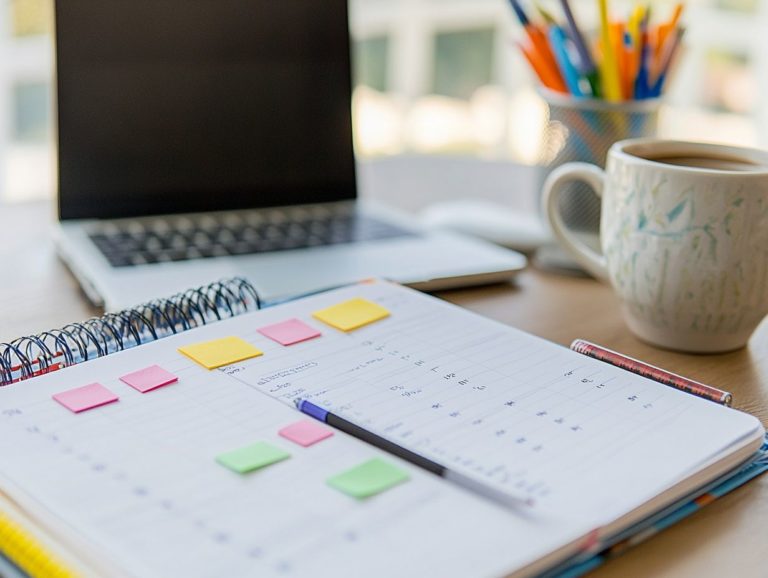how to adjust your study methods as you progress?
Understanding your learning style is essential in crafting an effective study routine. This guide will assist you in identifying your preferred study methods, from strategies tailored for beginners to advanced techniques suited for seasoned students. You’ll discover how to adapt your approach as you progress, ensuring you unlock your full potential.
We will explore the importance of maintaining a balanced study routine and provide tips for staying motivated and productive. Join us on this exciting journey to make your study sessions not only effective but also genuinely enjoyable!
Contents
- Key Takeaways:
- Understanding Your Learning Style
- Study Methods for Different Stages of Learning
- Adapting Your Study Methods as You Progress
- Maintaining a Balanced Study Routine
- Staying Motivated and Focused
- Frequently Asked Questions
- Why is it important to adjust my study methods as I progress?
- How can I identify when it’s time to adjust my study methods?
- Ready to step up your study game? What are some effective ways to adjust my study methods?
- How should I adjust my study methods for a specific subject?
- Do I need to change my study methods as I progress?
- What if my adjustments to study methods don’t work?
Key Takeaways:

Discover your learning style to determine which study methods work best for you.
Adjust your study methods as you progress by using different techniques based on your level of learning. For insights on how to analyze your study progress, beginners should focus on building a strong foundation, while advanced students can utilize more sophisticated techniques.
Maintain a balanced study routine by incorporating various methods for optimal results and recognizing when it’s time to change your approach.
Understanding Your Learning Style
Understanding how you learn best is essential for creating effective study techniques that suit you. By determining whether you are a visual, auditory, or kinesthetic learner, you can optimize your study environment and methods. This ultimately enhances your memory retention and academic success.
This self-awareness helps you choose the right educational resources and adapt your study strategies to various subjects and formats. Recognizing your preferred learning style fosters active learning, transforming your studying experience into one that is more engaged and productive.
Identifying Your Preferred Study Methods
Identifying your preferred study methods is crucial for unlocking your full learning potential. Techniques like the Feynman Technique, which involves explaining concepts in simple terms, and the SQ3R method, which stands for Survey, Question, Read, Recite, and Review, can offer you structured pathways to navigate complex material.
Self-quizzing also fosters active recall and deeper retention of information. By implementing these study strategies, you can craft personalized review material that aligns with your unique learning style.
The Feynman Technique encourages you to break down concepts into simple terms, enhancing your understanding and pinpointing areas that require more attention. This method not only bolsters comprehension but also elevates your confidence as you master the material.
The SQ3R method invites you to engage deeply with the content, nurturing critical thinking and strengthening memory retention. Both strategies can be tailored to meet your individual needs, highlighting the significance of personalizing study techniques to maximize your results.
Incorporating self-quizzing into these methods further solidifies your understanding, allowing you to regularly evaluate your grasp of the material and make adjustments as necessary.
Study Methods for Different Stages of Learning
Different stages of learning demand tailored study methods to ensure effective engagement and elevate your academic performance. As a beginner, you’ll find that techniques like retrieval practice and spaced repetition are invaluable. They not only support gradual mastery of concepts but also enhance memory retention.
As you advance, it’s essential to adapt your study strategies to include more sophisticated approaches that align with your expanding knowledge and the increasing demands of your coursework. Learning how to customize your study approach for tests can help you maximize your study potential!
Effective Strategies for Beginners

Effective study strategies like practice tests and flashcards can significantly enhance your understanding and retention of material. These techniques help build a solid foundation for your studies. Over time, they will help you develop strong study habits.
Goal setting is crucial. It defines clear objectives, motivating you to engage actively with the material. To start with practice tests, create your own based on the subject matter. This not only reinforces your knowledge but also familiarizes you with exam formats.
Flashcards are versatile tools ideal for memorizing definitions, formulas, or vocabulary. You can easily arrange them for quick review sessions. Setting specific, achievable goals like completing a certain number of practice questions each week provides a sense of accomplishment and direction, fostering responsibility and consistency.
By integrating these techniques and maintaining a focused mindset, you can pave your way toward academic success and cultivate lasting study habits.
Advanced Techniques for Advanced Students
Advanced students can elevate their study techniques by incorporating new methods like mind mapping and color-coded notes. These methods enhance comprehension and help organize complex topics.
Joining study groups is an excellent way to engage in collaborative learning. It offers you diverse perspectives that promote deeper understanding. Don t underestimate the power of study breaks; integrating them into your routine is crucial for maintaining focus and maximizing retention during those marathon study sessions.
Mind mapping is a way to visualize information by connecting different ideas. When you visualize information this way, you ll see connections between concepts that make it easier to retain knowledge.
Color-coded notes serve as fantastic tools for categorizing information, allowing you to quickly identify key themes and details. Collaborating with peers in study groups fosters discussion and the exchange of ideas, enriching your educational experience.
Regular study breaks whether just a few minutes or a bit longer rejuvenate your mind, reduce fatigue, and enhance productivity. This enables you to tackle your material with renewed energy and sharper focus.
Adapting Your Study Methods as You Progress
Adapting your study methods as you navigate your academic journey is crucial for ensuring effective learning retention and optimal study practices. If you find your current approach isn’t working, consider how to change your study methods. As you progress, refine your study schedule to minimize distractions and enhance time management.
This adaptability improves your study performance and aligns your techniques with the ever-evolving demands of your coursework and exams. Embracing this approach allows you to stay ahead and thrive in your academic pursuits.
Recognizing When to Change Your Approach
Recognizing when to change your study approach is essential for maintaining motivation and ensuring effective learning. If you notice a shift in your study environment or feel like progress has stalled, it might be time to reevaluate your strategy.
Incorporating study breaks and varying your techniques can rejuvenate your routine and enhance your performance, allowing you to adapt to different challenges. If you feel overwhelmed or struggle to focus, those are clear indicators that adjustments are needed.
Perhaps you’ve been sticking with the same methods for too long, and that monotony is dulling your enthusiasm. Exploring new study environments like libraries or coffee shops can provide a refreshing perspective.
Implementing short, intentional breaks during study sessions can boost retention and keep the learning process dynamic and engaging. By heeding these signals and adapting accordingly, you can cultivate a more effective and passionate approach to studying.
Maintaining a Balanced Study Routine

Maintaining a balanced study routine is essential for your academic performance and overall well-being. By establishing a structured study schedule that incorporates healthy snacks and regular exercise, you can significantly enhance your focus and cognitive function.
Additionally, curating an optimized study environment, free from distractions, supports effective learning. This approach makes it easier for you to engage with your study material and ultimately achieve your academic goals.
Incorporating Different Methods for Optimal Results
Incorporating a variety of study methods allows you to engage in active learning and enhance retention. Techniques like retrieval practice, which encourages self-quizzing, can be seamlessly integrated with collaborative efforts in a study group.
This multifaceted approach not only deepens your understanding of the material but also creates a dynamic learning experience tailored to your individual needs. By utilizing active learning techniques such as concept mapping and peer teaching alongside regular self-testing, you can further enrich your comprehension and retention.
Group study sessions offer a valuable platform for discussion. You and your peers can share diverse perspectives and clarify doubts, reinforcing your grasp of challenging concepts. The social aspect of studying in groups can significantly boost your motivation, making the learning process more enjoyable and less isolating.
By combining these strategies, you enhance engagement and cultivate essential skills like critical thinking and teamwork skills that will serve you well beyond the classroom.
Staying Motivated and Focused
Staying motivated and focused during your study sessions is key to unlocking your academic success!
Take regular study breaks. They can rejuvenate your mind! Calming music can help maintain concentration and ease anxiety.
Eliminate distractions to create a more conducive learning environment.
Tips for Maintaining Productivity
Effective study tips are essential for productivity. Here are some to consider:
- Prioritize time management.
- Develop an organized note-taking system.
- Create a consistent study schedule.
- Try the Pomodoro technique: study in focused sessions followed by short breaks.
By establishing a consistent study schedule, you create a structure that promotes focus and maximizes the efficiency of your learning efforts. This approach enables you to allocate specific time slots for different subjects.
Compiling neatly organized notes streamlines the revision process, making it easier for you to retrieve essential information. Incorporating digital tools or apps for note-taking can further enhance collaboration and accessibility.
By emphasizing the importance of regularly reviewing your notes, you reinforce your knowledge and boost retention, ultimately contributing to your academic success and a highly productive learning experience.
Frequently Asked Questions

Why is it important to adjust my study methods as I progress?
As you progress in your studies, the difficulty level of coursework and materials may increase. Adjusting your study methods, including how to switch between study techniques, ensures that you are effectively comprehending and retaining information, leading to better grades and overall success in your academic journey.
How can I identify when it’s time to adjust my study methods?
Pay attention to your grades, study habits, and overall understanding of the material. If you notice a decline in any of these areas, it may be time to adjust your study methods.
Ready to step up your study game? What are some effective ways to adjust my study methods?
Depending on your learning style and the subject matter, some effective ways to adjust your study methods may include creating flashcards, reorganizing notes, utilizing study groups, or seeking guidance from a tutor or professor.
How should I adjust my study methods for a specific subject?
Start by identifying your strengths and weaknesses in the subject. Then, tailor your study methods to enhance your strengths and work on your weaknesses.
Do I need to change my study methods as I progress?
You don t need to completely change your methods. Small tweaks or new techniques might be all you need to stay effective.
What if my adjustments to study methods don’t work?
Don t be discouraged if your first attempt doesn’t bring instant results. Keep experimenting with different approaches until you discover what suits you best.






